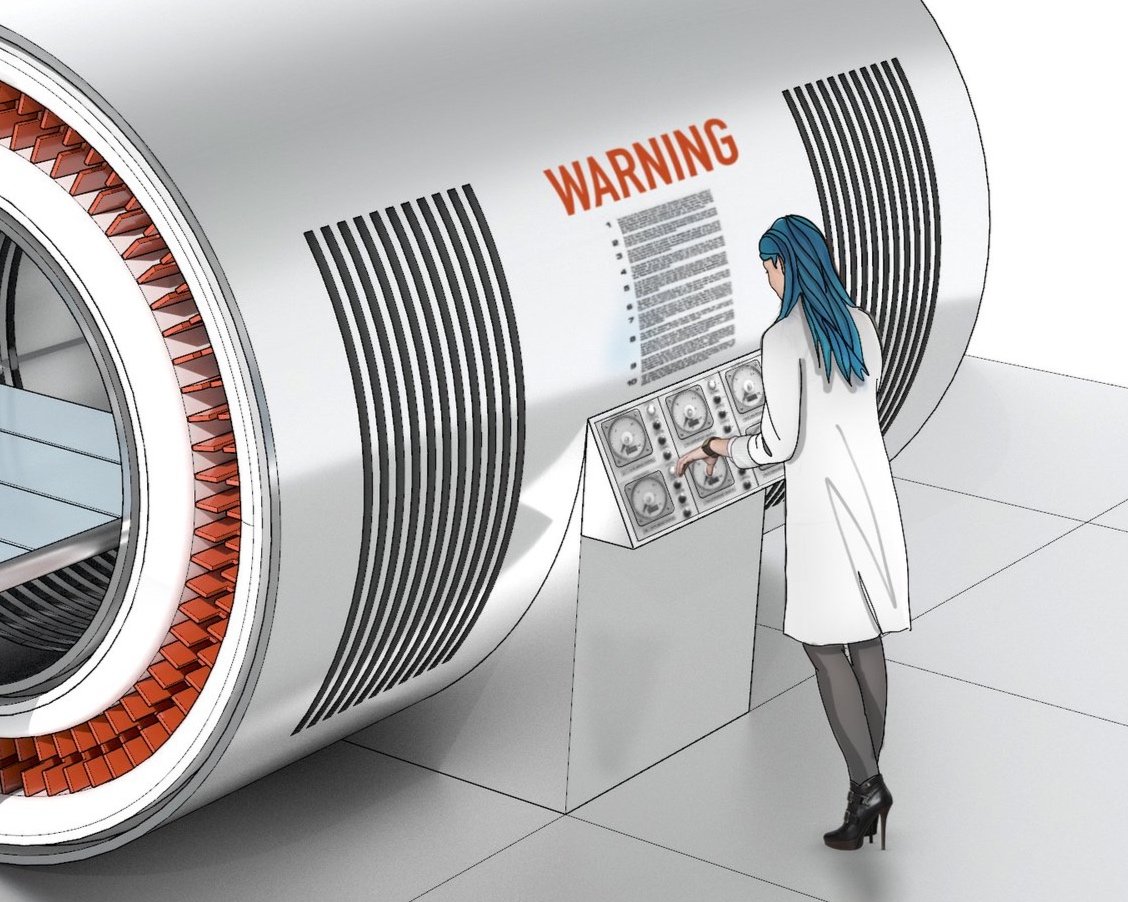WOULD YOU LIVE FOREVER IF YOU COULD ONLY REMEMBER A FRACTION OF IT?
What price a forgotten eternity?
The Cortex Intelligent Machines Mark 3 Full Body Scanner.
On other pages here I discuss how the idea for scanning and reprinting people was the initial concept behind the Cortex series. 3D bioprinting is already in use—albeit in very simple terms—and each 3D print requires a computer model to tell the printer what to print and where. That means to reprint someone, you’d need a digital model of them. Where would this print file come from? There are two principle approaches:
1. The information comes from an original human body.
2. The information is artificial, being generated by an AI or other smart system.
In the first instance—working with an existing body—how would you generate that data? I initially thought of something similar to a modern MRI—Magnetic Resonance Imaging—machine. MRIs take images of the body. To turn these images into a 3D digital model requires software processing and interpretation (Turning MRI scans into 3d models)
This means the resultant 3D models are not an exact copy of the individual. I felt that to truly replicate somebody’s consciousness (or their soul, if you prefer to think about it that way), you would want to duplicate their brain in a perfect way with no machine interpretation. To do that you’d need a machine capable of recording the body down to its atomic level, then tagging every atom’s type and location.
That led me to design a new complete-body-scanner. These scanners are the one thing in my books that are a total sci-fi invention. Yeah, I tried to base them upon some modern ideas, but I used a lot of artistic license as well 😇
The design is partially based upon particle accelerators: the scanner fires protons at the subject from three different points, triangulating the beams to focus upon a specific atom, breaking it apart and recording its atomic layout via the recoiling debris.
The scanner then records the particles and radiation released to determine the atom destroyed, and its three-dimensional location. So what would they look like? The idea of triple particle accelerators in a contained space lead me to design the scanners as large, heavy cylinders. Why?
First, so they read as an update to current MRI scanners. Second to mimic the circular designs of some accelerators: the protons spin around the drum until they reach the required energy levels, then are fired at the body, recording its layout.
Above: detail of the scanner 'mouth.'
The 'mouth' was the most complex part of the design to get right, and it took a lot work. After many false starts I thought about the 'kit-of-parts' approach I used for the Hopper and CWS gun designs (I will write two emails about Alice's weapons in a few weeks). The guns are cooled by a radial heat-fin, so I took that as design inspiration. The scanner is circular, and likely to produce a lot of heat: I added an inner, solid portion containing the person; a large, red, radial heats-sink array to cool the machine; then the outer shell containing the triple particle accelerators.
Alice's CWS handgun has a circular heat-sink set into the front color-coded cartridge. (Gun design will be dealt with in another page.)
In efforts to make the scanner as subliminally threatening as possible, I added vertical ventilation 'gills' either side of the control panel designed to give the machine the subtle look of a sharks head, with the red fins as teeth . . . (see above for detail of the image, and a Great White photo below). More details about the WARNING text below 😛
CERN's Large Hadron Collider (CERN) 27 kilometer ring. Should be easy shrinking this to room size 🤥 👍 😀
Can you spot the person? He's in there somewhere . . .
A beam from the particle accelerator strikes a target, and a detector records information about the recoiling debris: angles, momentum, energy of the scattered particles producing these beautiful images . .
To record an entire body this way requires a huge amount of energy, hence each scanner is located close to a large fusion reactor. The amounts of information generated also necessitates a specialized Mechanical Intelligence being involved in both the scanning and reprinting phases. As opposed to the ones in printers, the MIs used in scanners are typically remote due to their needed uninterrupted power supplies of vast sizes.
Now back to that warning text: some of you may recognize them from my favorite film. Do you know what this is from? 😀 (I will reveal all on the next page. . .)
Being able to record an entire person exactly—down to the subatomic level—raises many moral issues, not to mention the technology has a serious flaw. I will get into that on the next page…
(I hope you're liking this deep dive into 2055. This take a huge amount of time to do, but I love sharing the work with you. In return, If you've read any of my books would it be possible for you to take a moment to leave a review here (USA / UK / CA / AU) please? It only takes a few seconds, and would be incredibly helpful. Reviews help authors — a lot. And please do tell your friends and family. Word of mouth recommendations are the best thing for an author, and finding new readers is vital. As always, thank you so much for all your love and support.)









